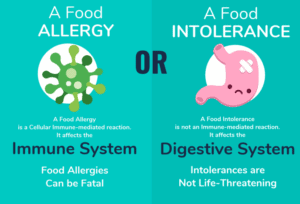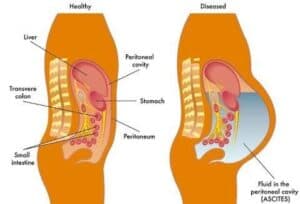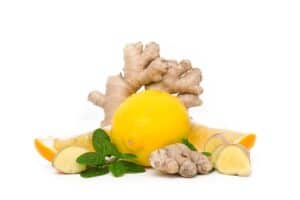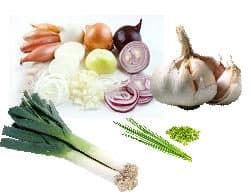10 Causes of Abdominal Bloating and What You Can Do to Fix Abdominal Bloating.

Symptoms of the bloated abdomen
Fortunately, in some cases, abdominal bloating is nothing to worry about. It can usually be resolved by making some simple changes to diet and habits, although not always.
In addition to feeling full, gas and pain in the abdomen, you should check to see if your bloated stomach is occurring simultaneously with other symptoms throughout the body.
This can give you an idea of the cause of the problem and whether it might be serious enough to warrant a doctor's visit.
Relieve abdominal bloating
If you feel bloated, check for other symptoms, including:
- Fever
- Skin rash or hives
- Watery eyes
- itchy throat and other signs of an allergic reaction
- Constipation or diarrhea
- Vomiting or nausea
- Blood in your urine or stool
- Unexpected weight loss
- Pain around your lymph nodes, including in the groin, throat, or armpits
- Fatigue
- Brain fog and concentration disorders
- Irregular periods
- Hemorrhoids
10 possible causes of a bloated stomach
- Digestive Disorders
- Food allergies or sensitivities
- Dehydration
- SIBO Infection
- Fluid retention
- Constipation / constipation
- Heartburn deficiency
- Food allergies or sensitivities
- Hormonal changes
- Intestinal obstruction
1. Digestive disorders
Most people dealing with various functional gastrointestinal disorders such as IBS, ulcerative colitis and celiac disease have bloating, gas, flatulence, and other symptoms. Some studies show that abdominal bloating is experienced by 23 percent to 96 percent of people with IBS (with disrupted gut flora), 50 percent with functional dyspepsia (abdominal discomfort), and 56 percent with chronic constipation. More about the study.
2. Food allergies or sensitivities

Often times, food allergies, sensitivities, or intolerances (such as lactose intolerance) are common reasons for gas and bloating.
The foods that cause gas include dairy products, gluten-containing foods (most breads, pasta, rolls, grains, etc.), and certain types of carbohydrates called FODMAPs.
There are dozens of other possible food allergies (such as shellfish, nuts and eggs), but you probably know what you're reacting to.
FODMAPs can be tricky to rule out because there are so many different types and everyone is unique in their tolerance.
An elimination diet can help you determine which foods can cause bloating (such as apples or avocados) because they aren't broken down and digested properly.
Work with an expert who understands it.
3. Dehydration
Have you ever found yourself feeling dehydrated and bloated the day after eating salted foods or drinking alcohol?
Dehydration and electrolyte imbalance both stop digestion and make regular bowel movements difficult.
When your body tries to recover from dehydration, it retains excess water to keep the situation from happening again. In addition, you can get constipation. This means that if you end up drinking more fluids, you are likely to get extra bloating around the belly.
4. Constipation
This is perhaps the most obvious reason for bloating – you need to go to the bathroom! Constipation can cause fecal matter to get stuck in your intestines, causing a hard stomach, pain, discomfort, and gas. The biggest reasons for constipation are constipation include eating too little fiber, not drinking enough water, being too sedentary/avoiding physical activity and stress.
5. Water retention, also known as water retention, edema or ascites

You may also notice that jewelry and clothing become tighter, extra swelling and pain around joints or tightness in the skin.
Sometimes the body retains water, including near the abdomen or pelvic area, causing excessive bloating and temporary weight gain.
The water retention or fluid retention in the abdomen is known as ascites and it can be a sign of a more serious health condition. Ascites can be the result of an abdominal infection, liver disease or, although rarely, even cancer. Also check for other signs of liver failure or hepatitis, including yellowing of the skin (jaundice), changes in the white color of your eyes, or stomach pain.
6. Heartburn deficiency
Often people with heartburn have too little stomach acid. Sounds crazy but it is true.
The food slurry in your stomach will not leave your stomach until the slurry has a certain acidity. It is usually between 1 and 3 Ph (acidity). The presence of bacteria such as H. pylori increases the acidity, which becomes more basic. This makes certain foods, such as proteins, more difficult to split and digest.
Too little stomach acid will cause the mash to lie longer and start to ferment and rot. This creates gases and causes bloating and regurgitation.
If you take antacids while taking too much little stomach acid you confuse the entire digestive system.
As a result, nutrients from the diet can no longer be properly absorbed and you eventually get important nutrients in your body.
7. SIBO. Bacterial overgrowth in the small intestine

Small intestinal bacterial overgrowth (SIBO) is caused by high levels of abnormal bacteria that live in the digestive tract. Somewhere in the small intestine where they can build up after taking antibiotics or due to inflammation and poor digestion.
Some foods can cause SIBO symptoms and related sensitivities in the digestive tract, including FODMAPS, which in some cases can ferment abnormally during digestion.
8. Hormonal changes
PMS is known to cause bloating and digestive problems as it predisposes you to constipation and water retention.
This is common and not too worrying unless you notice other serious symptoms such as an irregular menstrual cycle, uterine fibroids or severe cramps.
9. Infection
You can become bloated and distended or develop ascites if you are dealing with an infection. This is because it increases inflammation levels caused by an increased number of white blood cells around the pelvis, urinary tract and gastrointestinal tract.
Check for signs of fever, redness and pain, and swollen lymph nodes, which are usually associated with a serious infection.
10. Bowel obstruction
Sometimes a severely bloated stomach (although it's not really the stomach) - along with constipation, nausea, and vomiting - is due to a bowel obstruction. This can be caused by scar tissue or a tumor in the small intestine or colon, or other causes.
When these grow and press against the intestine, the intestines become blocked and retain moisture and stool. You probably know this is what you are dealing with as it is usually very painful and keeps you from going to the bathroom normally.
It is important to see your doctor and get immediate medical treatment.

The best foods for bloating
Your diet plays a big role in regulating the amount of air and feces trapped in your digestive tract.
- Probiotics: “Good bacteria”, called probiotics, act like friendly gut bacteria in your digestive tract and kill bad bacteria that can cause digestive problems.
- Natural probiotic foods such as kimchi, saurerkraut, yogurt, kefir and kombucha.
- Raw dairy: In the case of dairy, I always recommend consuming raw dairy as opposed to the conventional kind sold in supermarkets, which is pasteurized / homogenized. Manufacturing processes can kill enzymes necessary for proper digestion, even to the point that some people who think they have symptoms of lactose intolerance can consume raw dairy products without having negative reactions.
- It also helps to avoid flavored yogurt containing artificial ingredients, consuming raw milk cheese (not for pregnant women), kefir / yogurt instead of milk, which are lower in lactose.
- Water-rich fruits and vegetables: Fruits and vegetables that provide water, important electrolytes, and helpful enzymes are your best friends for bloating.
- Eat more raw or cooked leafy greens, cucumber, celery, fennel, artichoke, melon, berries, steamed vegetables and cultured / fermented vegetables.
- Herbs, Spices and Teas: Natural digestive soothing herbs such as ginger, dandelion, aloe vera and fennel have been used for thousands of years to soothe a bloated stomach.
- Many herbs act as diuretics and help the body release extra fluid, while some, such as ginger, can also help the stomach.
- Do not forget that bone broth and green tea are also anti-inflammatory and are great choices for promoting gut health.
Avoid foods to help with abdominal bloating

- Sugar and sweetened snacks: Sugar ferments easily in the gut, can contribute to candida growth, and promote inflammation.
- Most Dairy Products: These are flavored yogurts with sugar and artificial ingredients, but also other types as modern manufacturing processes can remove important enzymes in dairy.
- Refined grains and grain products: Gluten is difficult for many people to digest, and in some cases corn, oats and other grains are too.
- In some cases, hard-to-digest vegetables such as broccoli, cabbage, cauliflower, onion and even garlic: these contain sulfur and certain types of FODMAP carbohydrates.
- Beans and legumes, which can promote gas
- Carbonated drinks
- Chewing gum.
- In some cases, certain types of fermentable fruit, including apples, peaches / other fruit with seeds and avocados, can cause bloating.
- Artificial Sweeteners and Sugar Alcohols: These include aspartame, sorbitol, mannitol and xylitol.
Maybe also interesting to read
- Natural remedy for heartburn
- Orthomolecular nutrition & Hypnotherapy workshop in the beautiful garden at the Gulp
- Leaky gut and its link with autoimmune diseases
- Irritable Bowel Syndrome (IBS)
- How long does the transition take?
- Pfeiffer's disease and EBV
- Peptic ulcer symptoms and treatment
- fibroid weight gain
- relieve bloated stomach





5 thoughts on “Opgeblazen gevoel buik verhelpen”
I came to Elena with complaints of fatigue and bloating and weight gain. After research it turned out that I had a number of parasites left over from food poisoning in Mali. To combat this she gave me a course of natural orthomolecular tinctures / supplements. In addition, I received advice about a healthy diet and diet, which made me lose at least 8 kilos and felt more and more energetic. Thanks to her support, I managed to keep it up and I now feel very healthy and keep on weight.
Hello, I have read the message and also wanted to write, I have had abdominal distension and stomach complaints for 2 years, it happened after an operation, I have also gained 15 kilos, I would also like to be helped
Hello,
I need to know a little more to find out.
This can be helicobacter present, liver problems, overgrowth of bacteria or fungi etc.
Hello,
To find out what's going on I need to know a little more.
This can be helicobacter present, liver problems, overgrowth of bacteria or fungi etc.
To help you we need to make an appointment, then ask questions and will prescribe a therapy on a natural basis.
Pingback: What to do in case of panic attacks? Personal experience